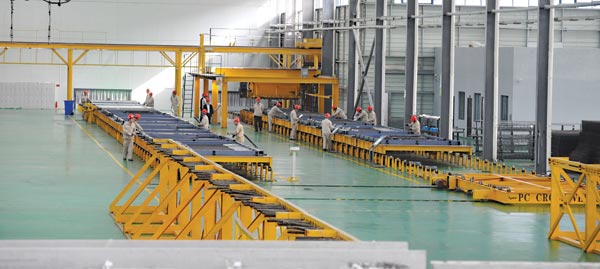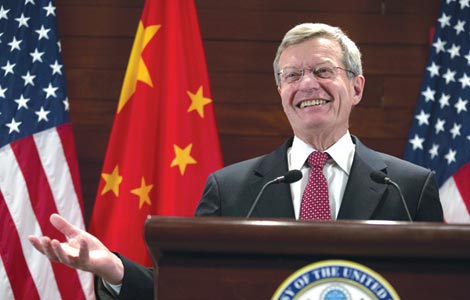Hunan looks to summit to boost Latin American ties
Updated: 2014-03-17 05:13
By Zhang Fan in Beijing (China Daily Latin America)
|
|||||||||
Central China's Hunan province is seeking further economic cooperation with Latin American countries through the upcoming China-Latin America Business Summit, an official of Hunan province said recently.
"Hunan and Latin America have developed close relationships in multiple industries, which have all led to positive results … Such cooperation enjoys a bright future," said He Baoxiang, the vice-governor of Hunan province.
 |
|
Industrialized houses being assembled by workers of Broad Homes Industrial Co Ltd in Changsha, capital city of China's Hunan province. The first shipment headed for Suriname in South America in November 2013. Xinhua |
He made the remarks at a conference promoting the Eighth China-Latin America Business Summit, which will be held in Changsha, Hunan's capital city, in September.
The annual summit, established in 2007 by the Chinese government to improve communication between Chinese and Latin American companies, is now the largest economic promotion summit between China and Latin America.
"Hunan province, as the co-holder of this summit, is actively preparing for the event. We believe the summit can help to enhance the communication between Hunan and Latin American countries and promote economic cooperation," said He.
Observers think that He's words show that Hunan and other Central China provinces are trying to enlarge their share in the Latin American market, which is regarded as a perfect choice for promoting economic development.
"Latin America is very special because most of the regional countries are new emerging countries with significant economic development and steady social environment, which makes this region a better market than other areas including Africa and Southeast Asia," said Zhou Xinyu, a research fellow of emerging economies at the Beijing Foreign Studies University.
"The regional governments are eager to further stimulate local economy through infrastructure construction, which means a large market for Chinese companies," Zhou added.
Hunan province enjoys a leading position in China's construction machinery industry. Two of China's largest companies in this field, the private enterprises SANY Heavy Industry Group and Zoomlion Heavy Industry Corporation, are located in Changsha, Hunan's capital.
"Hunan is not among China's traditional exporting provinces, which are mostly located along the east coast of China. However, Hunan has a very good economic foundation and enjoys technological advantages in many fields, especially infrastructure industry, which promise Hunan a rather strong competitiveness," said Zhou Zhiwei, a researcher on Brazilian studies at the Chinese Academy of Social Sciences.
Following Hunan's strategy of encouraging local companies to participate in global economy, SANY has established international headquarters in the United States, Germany and India, and it entered the Brazilian market in 2007.
Just a few days ago, its Brazil branch announced that SANY sold more than 200 cranes in 2013, covering about 35 percent of the local market.
Besides SANY, Zoomlion also entered the Brazilian market and established its local office in 2010, which is viewed as an important step to explore the Latin American market.
"I think SANY and Zoomlion can be developed as a successful model for private enterprises going international with the help of local governments. Such a model is very valuable for Hunan and other Central China provinces," Zhou Xinyu said.
By the end of 2013, bilateral trade between Hunan and Latin American countries had reached $2.17 billion. During the first month of 2014, Hunan's imports from Brazil have increased sevenfold, much larger than Hunan's other trade partners, according to Hunan province's Department of Commerce.
However, Zhou Zhiwei said Hunan's companies still lack experience in global commerce compared with other Chinese companies.
"Latin America can be a good market for Hunan's companies, but these companies may find the local culture and complicated legal system rather difficult obstacles to conquer. The government should help to establish channels for their companies to get a clearer image of the targeted market," he added.

 New US envoy hits ground running
New US envoy hits ground running
 HK cellist to perform at Carnegie Hall
HK cellist to perform at Carnegie Hall
 Skyscrapers in E China resemble LV check pattern
Skyscrapers in E China resemble LV check pattern
 President Xi honors memory of devoted county Party chief
President Xi honors memory of devoted county Party chief
 More than just food
More than just food
 Miss world visits cancer children in Colombia
Miss world visits cancer children in Colombia
 Chinese paintings exhibited at Sotheby's
Chinese paintings exhibited at Sotheby's
 Jewish holiday of Purim celebrated in US
Jewish holiday of Purim celebrated in US
Most Viewed
Editor's Picks

|

|

|

|

|

|
Today's Top News
China remains No 1 holder of US T-bill debt
Chinese treasures on the block
China must expand inbound tourism
California shelves proposal
Tourists offered compensation for bad air days
US first lady's China visit to boost relations
New US envoy hits ground running
Tourists offered compensation for bad air days
US Weekly

|

|








